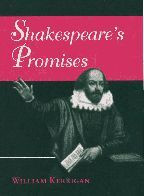"It is impossible to imagine any kind of moral life without obligations, and impossible to imagine obligations without types of promises. We are always up against them. Before we ever reflect on what a promise is, we have made them and are expected to make more of them. We are born into nations that enter into treaties and agreements. Promises are with us like gravity. Man is a promising animal."—from Shakespeare's Promises
Oaths, vows, contracts, and promises are among the most momentous actions human beings can perform, in art as well as life. Although virtually ignored by literary theorists...
"It is impossible to imagine any kind of moral life without obligations, and impossible to imagine obligations without types of promises. We are always up against them. Before we ever reflect on what a promise is, we have made them and are expected to make more of them. We are born into nations that enter into treaties and agreements. Promises are with us like gravity. Man is a promising animal."—from Shakespeare's Promises
Oaths, vows, contracts, and promises are among the most momentous actions human beings can perform, in art as well as life. Although virtually ignored by literary theorists, these obligations motivate plots, test characters, provide rhetorical occasions, structure ironies, and open thematic horizons. According to William Kerrigan, they had particular importance for Shakespeare, who wrote at a decisive moment in the history of promising, toward the end of its High Christian phase and near the beginning of its metaphysically lessened, though still central, role in the "contractual" state. Motivating his plots and supplying his characters with lofty rhetorical occasions, Shakespeare gave promising great dramatic life. More than that, promises made and kept "in good faith" reside at the heart of his idealism. Yet he also explores the ways in which promising and morality, for a variety of reasons, part company.
Kerrigan's is the first book to treat this subject with the amplitude it deserves. After a discussion of promises in philosophy, law, psychology, politics, language, and ordinary life, the author presents detailed studies of Richard III, The Merchant of Venice, and Othello, and concludes with a brief visit to the swearing scene in Hamlet. Shakespeare's Promises is a unique and valuable resource, providing a fresh perspective that will benefit all readers of Shakespeare.







